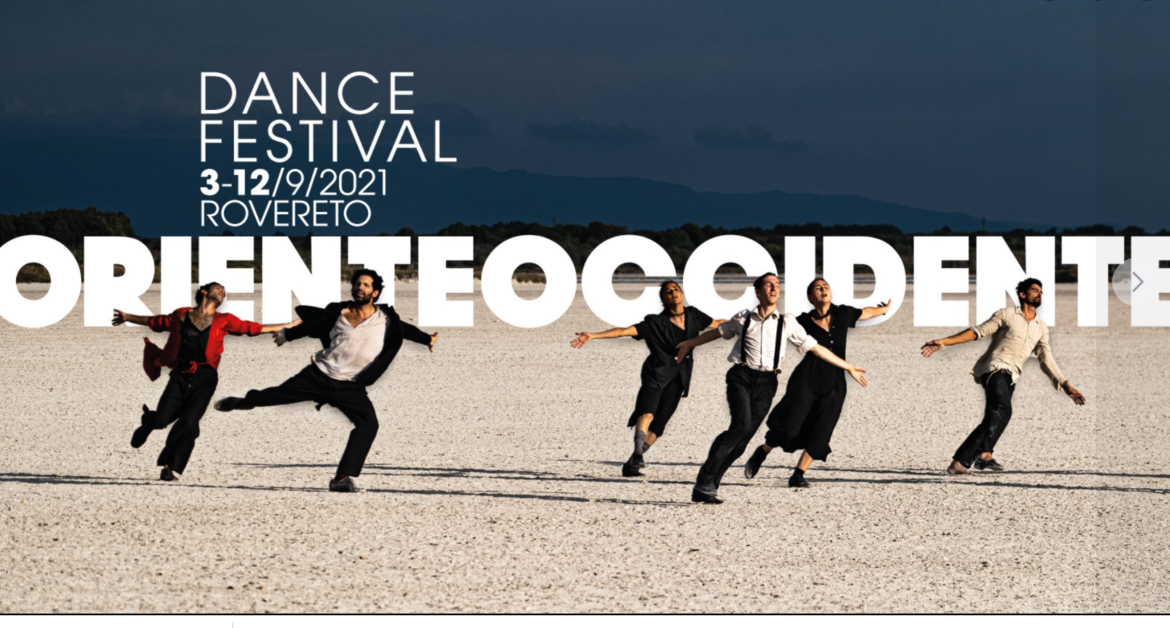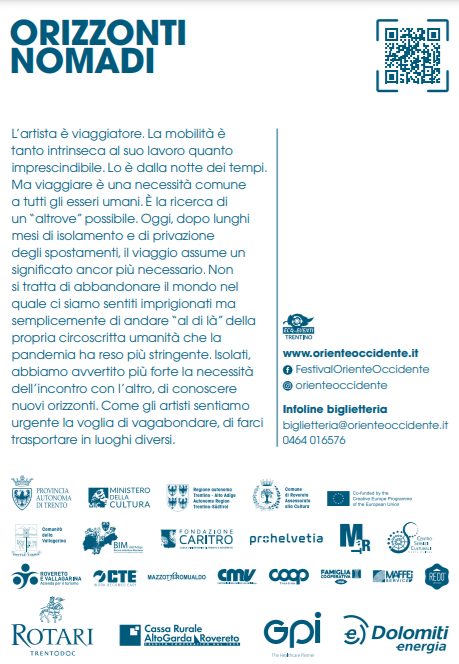Oriente Occidente 2021
Nomads, Border years

Looking to the horizon, to see the future
Performing artists are travellers. Mobility is as intrinsic to their work as it is inescapable, and it’s been so since the dawn of time. But travelling is a necessity common to all human beings. It’s the search for a possible “elsewhere”. Today, after many months of confinement and isolation, travelling has taken an even more essential meaning. It’s not just a question of finally being able to leave the enclosed world we felt imprisoned in, but simply of going “beyond” our own limited human nature, made more pressing by the pandemic. While confined, our need to meet others, to discover new horizons, was heightened. Like artists, we now feel an urgent need to wander, to be carried away to different places. Hence, the idea of a programme influenced by artists who refuse to be pigeonholed within a specific niche but love to explore, transmit, interact osmotically with their surroundings, give and receive knowledge. They’re artists eager to engage, speak out and recover the instinctiveness of contact with the world around them, all features peculiar to the art of dancing.
As emphasised by Michela Lucenti, once again hosted at the Festival with a project for her Balletto Civile (FIGLI DI UN DIO UBRIACO. Incursioni fisiche sui madrigali di Monteverdi) and a place-specific work on Trentino with local amateur performers (20 DI/VERSI. Madrigali contemporanei), the question today is no longer the Hamletic “to be or not to be” but rather “to be with the other or against the other”, to rediscover the sense of community in this journey: no community can be formed without proximity, without listening to others.
A powerful community, driven by visceral instincts and contagious movements, is the protagonist of the opening show called Political Mother Unplugged by Israeli Hofesh Shechter, for his Shechter II, and his first time at Oriente Occidente. A journey into seismic rebellion by a group of young people through digital images and high decibel music.
Always on the edge of public denunciation, in search of relational and social truths, Maguy Marin is back at Oriente Occidente with her seminal work Umwelt, a tourbillon of appearances and disappearances on the defeat of our world, overwhelmed by consumerism and the exhausting pursuit of a nameless something.
Bordering on the surreal is the “nomadic” poetics of Peeping Tom. In the diptych The Missing Door and The Lost Room, premiering in Rovereto, extravagant souls, lost in time and space, spasmodically search for one another in a Freudian house of the mind.
The theme of exile, of the moral condition of those who feel estranged from the world in which they live, is the focus of Elegìa delle cose perdute, a composite multimedia project by Zerogrammi conceived during the company's residency in uncontaminated parts of Sardinia, whose characteristic landscape becomes the setting for the film associated with the performance.
The protagonists of The Fifth Winter, Pep Ramis and Maria Muñoz, aka Mal Pelo, back after last year's success at the Festival, await the passing of the fifth winter. Their mental pilgrimage is musically scored by the preludes and fugues of Bach’s Well-tempered Clavier, featuring a solo performed by Federica Porello, in which the German composer’s energy-sapping variations and the counterpoint voices work up to a state of physical exhaustion. Chiara Bersani also broods on the theme of waiting, giving voice to those who feel lost, those who do not know how to act.
The art-and-life couple Wang-Ramirez are global and peregrine, in terms of their roots and cultures. She’s German-Korean, he’s French-Spanish. Together they present their brand new You-Me and broaden their geographical horizons even further by bringing on stage a Greek hip hop dancer, a flamenco dancer and a French cellist to build a face-to-face dialogue made of movement and music, stories and experiences.
On the contrary, Daniele Ninarello – associate artist over the last year at Oriente Occidente – uses his body to protest in NOBODY NOBODY NOBODY. It’s ok not to be ok, a site-specific durational performance for the Mart, but also a one-man-show solo in which he gives voice and form to the process of self-consciousness that the physical constraints of the pandemic have overbearingly brought to the surface. A similar “cry”, this time by a denied generation, breaks out from Carlo Massari's Right, a reinterpretation of Stravinsky's Rite of Spring, a female creation for the Florentine company Opus Ballet. Pablo Girolami, an emerging author on the European scene, welcomed by the CID to a residency programme for his new creation Manbuhsona, travels in search of the origin of his personal instincts, beginning with the observation of courtship in birds.
Choros is a ceremony with a flavour of bygone days, in which the path of the individual touches on the collective. Il luogo dove si danza (Where people dance), is a place-specific project by Alessio Maria Romano for the Campana dei Caduti Memorial Bell in Rovereto, performed at the crack of dawn. A profound and respectful encounter with the other around the monument that celebrates peace in remembering all the war dead. Loredana Parrella's Juliette on the Road presents a voyage in search of love, a performance freely based on Shakespeare's Romeo and Juliet that unfolds through the streets of Rovereto. The four-year-long European project Europe Beyond Access, of which Oriente Occidente is a partner and sponsor, aims to break down barriers and break out of isolation. The project’s finale presents four duets: Feeling Good by Diego Tortelli, Cornered, by the young choreographer Faizah Grootens, Re-call by Venetsiana Kalampaliki and Fine lines by Roser López Espinosa.
The circus is a nomad-born acrobatic and aerial architecture. The Moroccan collective CIE Colokolo bears witness to this with their tentacular and global contemporary take, centred in Casablanca and grouping artists trained in the finest Korean- and Hungarian-style teeterboard acts, juggling, parkour and hip hop showcased in Chouf le ciel! also to the accompaniment of traditional Arab songs, a show that promises to conquer the sky like the aerial evolutions of the French À Fleur d'Airs.
Source: https://www.orienteoccidente.it/


